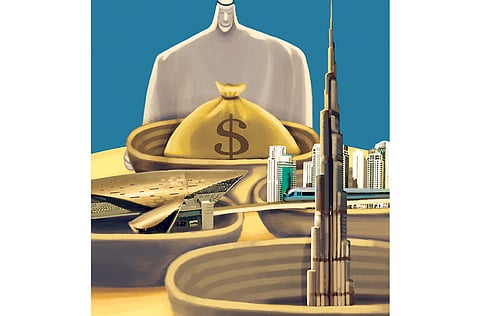D for Diversification: The UAE looks beyond oil
As part of our A to Z of the UAE, we look at how the UAE's varied economy has withstood low oil prices

Oil may have taken a bit of the sheen off the UAE’s economic performance, but the country has weathered the worst of low crude prices thanks to decades of diversification efforts, according to economists.
“The UAE has been a pioneer of fiscal adjustment in the region in response to the decline in oil prices,” says Mohammad Abu Basha, Vice-President of Research at Cairo-based EFG Hermes. “It was the first to cut fuel subsidies despite their stronger fiscal position than most of their peers in the GCC.”
The UAE and other oil-producing countries around the region are coping with lower prices for their output. Benchmark Brent crude plunged from more than $115 (Dh422) a barrel in June 2014 to less than $28 in January this year and traded at $45.4 in mid-November.
Despite the fall in oil prices, the UAE’s economy is weathering the plunge, says Mathias Angonin, analyst at Moody’s Investors Service. “Not only has it managed to diversify economically, it has also lowered its dependence on the hydrocarbons sector.”
Non-oil drivers
By most measures, the UAE is among the most diversified economies in the region, with trade and logistics, services, retail, tourism and aviation among the key drivers of non-oil growth, says Shady Shaher Al Borno, Head of Macro Strategy Research, Global Markets and Treasury, Emirates NBD.
The UAE also retains a clear lead as a global player in maritime shipping through its ports, with Dubai’s Jebel Ali port ranked among the top ten globally.
“The UAE is a global aviation hub through key international airports in Dubai and Abu Dhabi and is playing a lead role in new sectors such as renewables energy through Masdar in Abu Dhabi, for example,” says Al Borno.
Policymakers in the UAE have taken by far the boldest steps to adjust to low oil prices. In July last year, the government moved quickly to cut billions of dollars’ worth of petrol subsidies. According to the IMF, petroleum subsidies in the UAE amount to $7 billion a year and are part of a package of energy subsidies that total $29 billion — 6.6 per cent of GDP — including support for natural gas and electricity.
The change was part of the government’s plan “in diversifying sources of income, strengthening the economy and increasing its competitiveness in addition to building a strong economy that is not dependent on government subsidies”, Suhail Al Mazroui, UAE Minister of Energy, said in a statement announcing the move.
Will tax do it?
The decision is a precursor to other steps to diversify state revenue, including value-added and corporation taxes. The UAE cabinet has already approved a draft law for corporate taxation, according to a statement last year from the Ministry of Finance.
The government is also preparing a value-added tax (VAT) law expected to levy heavy fees on cigarettes and alcohol, with most food items exempted.
“The UAE introduced tough measures quickly, including the fuel subsidy reform and the reduction in capital expenditures,” says Angonin. “But the list of low-hanging fruits to raise revenue or reduce expenditures is getting shorter and shorter. The authorities are focusing on medium-term measures such as the VAT introduction in 2018 and 2019 and new forms of taxation.”
The UAE is targeting a growth rate of about 4 per cent next year as it looks to the non-oil economy for expansion, the undersecretary of the Ministry of Economy said in early November at the UAE Economic Planning Forum in Umm Al Quwain. The UAE’s economy grew 3.8 per cent last year, according to the Minister of Economy, Sultan Al Mansouri.
“We expect the UAE economy to grow by 3.4 per cent in 2017,” says Al Borno. “In the medium run, we expect Expo 2020 to have a positive impact on growth dynamics of the UAE as a whole as the non-oil sector will benefit from the flow of projects for the construction of facilities to host the 2020 event.”
Despite the odds, the UAE has been listed as one of the world’s most improved economies for doing business in the World Bank’s influential Ease of Doing Business rankings for 2017, surging into the top 30 for the first time. The country was ranked as the 26th-easiest country in the world for doing business, up from 34th place last year, putting it ahead of countries including France, the Netherlands and Japan.
The World Bank identified the UAE as one of the top ten most improved business environments over the past year, alongside Bahrain, Pakistan and Indonesia.
The introduction of the new regulations helped the UAE rise to the 9th best country in the world for minority investors’ protection, up from 48th in 2016, with minor improvements in ease of starting a business.
Sign up for the Daily Briefing
Get the latest news and updates straight to your inbox

